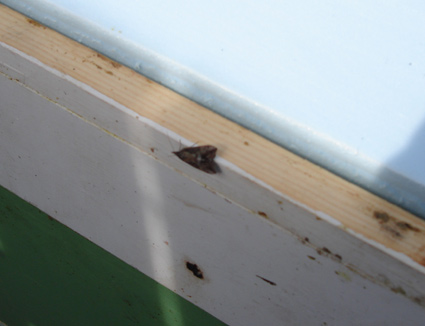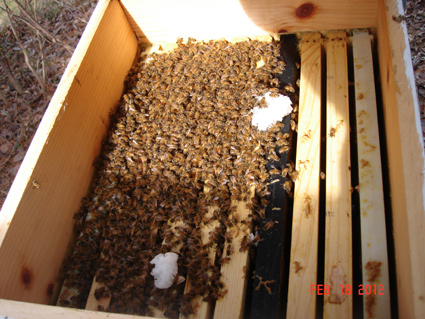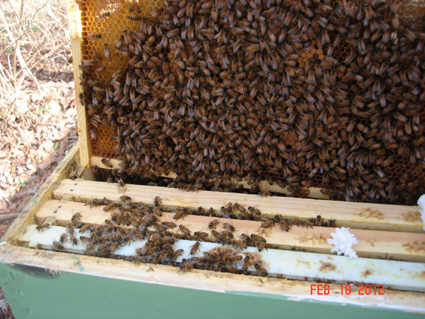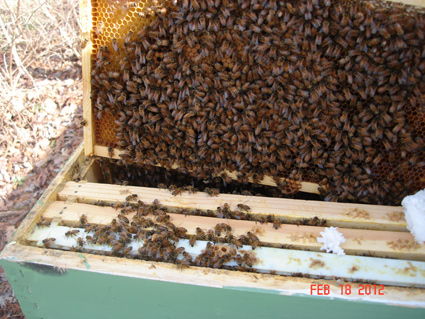Lots of Brood in the Purple Hive
The Eastern Missouri Beekeepers Association is taking orders for nucs and queens starting this week, and I needed to know if this hive was going to make it through the rest of winter or if I was going to be making an order to replace them.
They were my strongest hive last year, and I wasn't really concerned about them thus far.
I lifted the telescoping cover and discovered a moth sitting on the outer edge of the inner cover. I've heard this is common and they're there keeping warm, but I "removed" it anyways. We won't be seeing him anymore.

Taking off the inner cover, I was greeted with 6 and half frames of bees, many of them covering the top bars.

Starting from the right side of the picture, I removed frames 1-3 and they were full of nectar/honey. In fact, they don't look like they've been touched since fall.
Moving on to the other frames, I saw large patches of brood on both sides of 4 frames.

Some of the brood had the classic dark color capping, indicating they were close to hatching. This I found exciting, because it means the queen has been laying for some time already.

Some of the frames with brood were almost void of capped honey. Some of them had liquid nectar in them, but not as much as I would like to see. Remember frames 1-3 completely full and almost untouched? I'm thinking the cluster wouldn't move away from the brood and over to consume the full frames of honey in the cold weather.
With this amount of brood and several more weeks of winter still to come, I'm wondering if I should make some additional fondant candy and place it on the top bars where they can get to it easier. Even though the frames on either side of the brood nest is full of nectar, will they be able to reach it?
They were my strongest hive last year, and I wasn't really concerned about them thus far.
I lifted the telescoping cover and discovered a moth sitting on the outer edge of the inner cover. I've heard this is common and they're there keeping warm, but I "removed" it anyways. We won't be seeing him anymore.

Taking off the inner cover, I was greeted with 6 and half frames of bees, many of them covering the top bars.

Starting from the right side of the picture, I removed frames 1-3 and they were full of nectar/honey. In fact, they don't look like they've been touched since fall.
Moving on to the other frames, I saw large patches of brood on both sides of 4 frames.

Some of the brood had the classic dark color capping, indicating they were close to hatching. This I found exciting, because it means the queen has been laying for some time already.

Some of the frames with brood were almost void of capped honey. Some of them had liquid nectar in them, but not as much as I would like to see. Remember frames 1-3 completely full and almost untouched? I'm thinking the cluster wouldn't move away from the brood and over to consume the full frames of honey in the cold weather.
With this amount of brood and several more weeks of winter still to come, I'm wondering if I should make some additional fondant candy and place it on the top bars where they can get to it easier. Even though the frames on either side of the brood nest is full of nectar, will they be able to reach it?
Comments For This Post: (1) | Post Your Comments! Hide The Comment Form